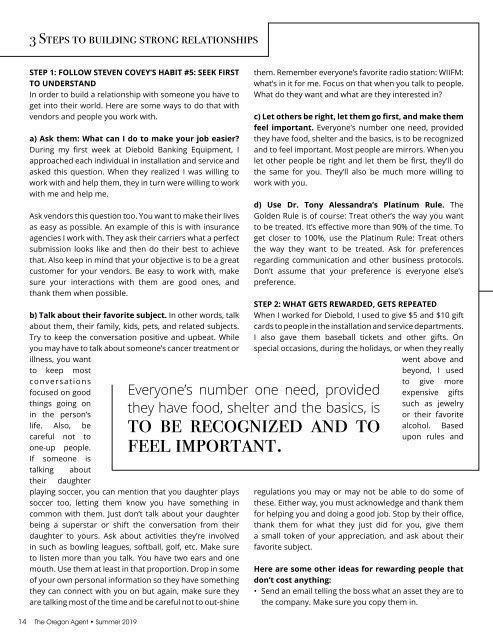You also want an ePaper? Increase the reach of your titles
YUMPU automatically turns print PDFs into web optimized ePapers that Google loves.
3 Steps to building strong relationships<br />
STEP 1: FOLLOW STEVEN COVEY’S HABIT #5: SEEK FIRST<br />
TO UNDERSTAND<br />
In order to build a relationship with someone you have to<br />
get into their world. Here are some ways to do that with<br />
vendors and people you work with.<br />
a) Ask them: What can I do to make your job easier?<br />
During my first week at Diebold Banking Equipment, I<br />
approached each individual in installation and service and<br />
asked this question. When they realized I was willing to<br />
work with and help them, they in turn were willing to work<br />
with me and help me.<br />
Ask vendors this question too. You want to make their lives<br />
as easy as possible. An example of this is with insurance<br />
agencies I work with. They ask their carriers what a perfect<br />
submission looks like and then do their best to achieve<br />
that. Also keep in mind that your objective is to be a great<br />
customer for your vendors. Be easy to work with, make<br />
sure your interactions with them are good ones, and<br />
thank them when possible.<br />
b) Talk about their favorite subject. In other words, talk<br />
about them, their family, kids, pets, and related subjects.<br />
Try to keep the conversation positive and upbeat. While<br />
you may have to talk about someone’s cancer treatment or<br />
illness, you want<br />
to keep most<br />
conversations<br />
focused on good<br />
things going on<br />
in the person’s<br />
life. Also, be<br />
careful not to<br />
one-up people.<br />
If someone is<br />
talking about<br />
their daughter<br />
playing soccer, you can mention that you daughter plays<br />
soccer too, letting them know you have something in<br />
common with them. Just don’t talk about your daughter<br />
being a superstar or shift the conversation from their<br />
daughter to yours. Ask about activities they’re involved<br />
in such as bowling leagues, softball, golf, etc. Make sure<br />
to listen more than you talk. You have two ears and one<br />
mouth. Use them at least in that proportion. Drop in some<br />
of your own personal information so they have something<br />
they can connect with you on but again, make sure they<br />
are talking most of the time and be careful not to out-shine<br />
them. Remember everyone’s favorite radio station: WIIFM:<br />
what’s in it for me. Focus on that when you talk to people.<br />
What do they want and what are they interested in?<br />
c) Let others be right, let them go first, and make them<br />
feel important. Everyone’s number one need, provided<br />
they have food, shelter and the basics, is to be recognized<br />
and to feel important. Most people are mirrors. When you<br />
let other people be right and let them be first, they’ll do<br />
the same for you. They’ll also be much more willing to<br />
work with you.<br />
d) Use Dr. Tony Alessandra’s Platinum Rule. The<br />
Golden Rule is of course: Treat other’s the way you want<br />
to be treated. It’s effective more than 90% of the time. To<br />
get closer to 100%, use the Platinum Rule: Treat others<br />
the way they want to be treated. Ask for preferences<br />
regarding communication and other business protocols.<br />
Don’t assume that your preference is everyone else’s<br />
preference.<br />
STEP 2: WHAT GETS REWARDED, GETS REPEATED<br />
When I worked for Diebold, I used to give $5 and $10 gift<br />
cards to people in the installation and service departments.<br />
I also gave them baseball tickets and other gifts. On<br />
special occasions, during the holidays, or when they really<br />
went above and<br />
beyond, I used<br />
to give more<br />
Everyone’s number one need, provided<br />
they have food, shelter and the basics, is<br />
to be recognized and to<br />
feel important.<br />
expensive gifts<br />
such as jewelry<br />
or their favorite<br />
alcohol. Based<br />
upon rules and<br />
regulations you may or may not be able to do some of<br />
these. Either way, you must acknowledge and thank them<br />
for helping you and doing a good job. Stop by their office,<br />
thank them for what they just did for you, give them<br />
a small token of your appreciation, and ask about their<br />
favorite subject.<br />
Here are some other ideas for rewarding people that<br />
don’t cost anything:<br />
• Send an email telling the boss what an asset they are to<br />
the company. Make sure you copy them in.<br />
14 The <strong>Oregon</strong> <strong>Agent</strong> • <strong>Summer</strong> <strong>2019</strong>


















